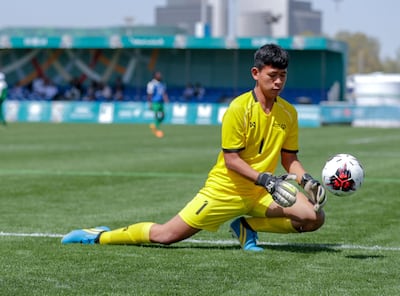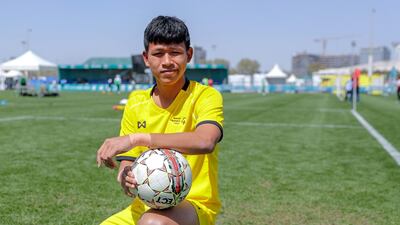Abandoned by his parents, sent to an orphanage and teased by classmates as a child, it has been a tough journey for Thai athlete Ardul Butsuri.
The teenager, 18, says he is no longer alone after finding a "new family" through sports and is making friends in his first Special Olympics World Games in Abu Dhabi this year.
A star goalkeeper for Thailand, Mr Butsuri dives and slides to save strikes from opponents that have included Germany and Ghana.
Sports has transformed him from a child who never made eye contact or interacted with people to a confident athlete keen to do his country proud.
"For many years, I felt lonely. I'm not alone any more. Sports has given me a new family. With Special Olympics Thailand, I train in table tennis, football and athletics. Everybody can follow their dream. I play football. My dream came true," he told The National.
“I always wanted to play for my country. Playing football feels good.”
Mr Butsuri’s story has been punctuated by loneliness since the age of four, when his parents battled drug addiction and neglected him and his nine siblings.
While some of his brothers and sisters were adopted, Mr Butsuri was sent to an orphanage in Lopburi, a city 150 kilometres north-east of Thai capital Bangkok.
The athlete lived with a foster family for five years but when things did not work out, he returned to the orphanage.
His developmental delays were picked up later at school and it exposed him to taunts from classmates, who made fun of his inability to keep up with school work.
"In that school, children were not nice, not friendly," said the soft-spoken Mr Butsuri.
“They mimicked me, they said I’m 'not normal'. It was better when I moved to a special school. I had more friends and there were activities.”
Dr Adinun Apivatgaroon, Thailand's team doctor, said there were similar stories of rejection of children with intellectual disabilities who were not diagnosed early.
“The problem occurs in the first phase of learning, before that no one recognises there is anything different. Not knowing why there is a difference in their abilities makes the children very unhappy,” said Dr Apivatgaroon.
Apart from sports, Mr Butsuri’s personal life has taken a positive turn, too.
A year ago, a social worker at the orphanage welcomed him into her home.
Still quiet for his age, Mr Butsuri, has told Thai officials that he finally has a sense of belonging in a “real family that cares”.

The orphanage has maintained contact with his parents. But scarred by the years of neglect, the footballer has told the orphanage he does not want to meet his family because the memories of his childhood are too upsetting.
“Maybe I will see them after I grow up, not now,” he said.
Head coach Sumran Chamchoi has seen Mr Butsuri change over the past decade, from a child who sat rooted to the spot to an active, talented sportsman.
“Ardul would sit still by himself. He was not responsive. Football has changed him because now he likes to participate, he communicates. He is not so shy any more,” said Mr Chamchoi.
Sport has also made him physically stronger and more able to overcome the colds and fever he frequently suffered from before.
Mr Chamchoi said it was easier to teach children with intellectual disabilities.
“They are like white paper. They have the ability to absorb a lot and train hard.”
Mr Butsuri's ambition is to train as a mechanic of cars and motorcycles, but he wants to continue to compete in the Special Olympics World Games.
“I want to work hard and win medals for my country," he said.

